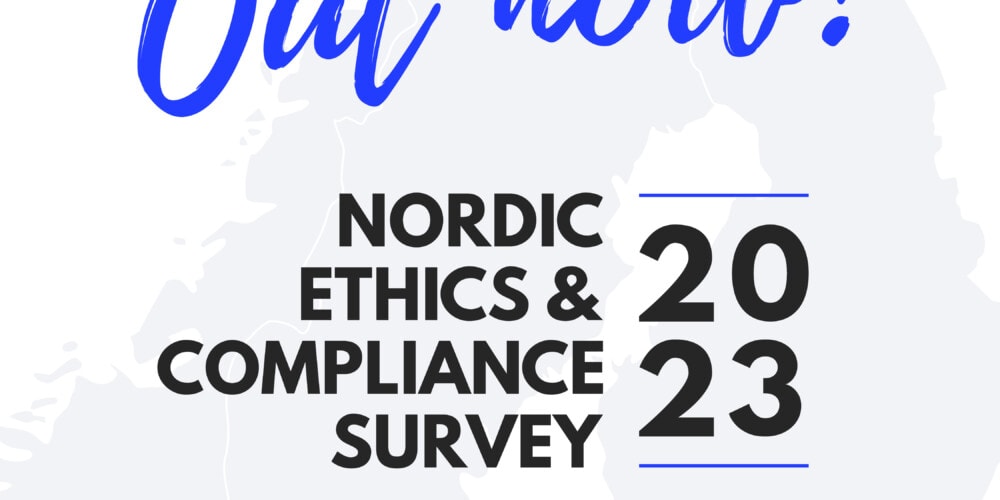Most of the employees in Nordic companies do not receive regular ethics training
A groundbreaking survey into how employees, in Finland, Norway and Sweden, perceive ethics at their workplaces reveal that over 90 % value an ethical working place higher than a salary increase or a promotion. Despite this over 80 % have witnessed unethical behavior at their workplace during the last year. The survey was launched by the founders of the Nordic Business Ethics Network, Niina Ratsula and Anna Romberg: “The Nordic countries are well placed in various indexes and surveys when it comes to e.g. corruption. We wanted to understand how this translates into actual conduct at our workplaces.”
The most common response is not to intervene
According to the survey the most common ethical misconduct experienced was disrespectful behavior, leadership that contradicts the corporate values, favoritism, nepotism and distorting of facts. Some 13 % of the respondents, and 21 % of top management, had witnessed bribery or corruption during the last year.
Over 40 % of the respondents replied that they did not know how to act when witnessing unethical behavior and 47 % of the respondents did not do anything when they witnessed ethical misconduct. The survey also revealed that formal whistleblowing channels are not that common, only 18 % of the respondents, from the private, public and non-profit sectors, said that they had access to a formal whistleblowing channel. The most common reporting channel is said to be the line manager (88 %). In combination with that one third of the line managers responded that they did not intervene when witnessing an ethical concern leaves room for significant improvement when it comes to channels and processes for raising and addressing ethical concerns.
Managers have a rosier picture of the reality than employees
The most important factors for an ethical working place is said to be the possibility to raise concerns without a fear for retaliation, respectful behavior and fair and transparent decision-making. The survey reveals a deviation between how employees and managers perceive that these factors are applied in practice. For example almost 80 % of managers perceive that employees always are treated with respect when only 60 % of employees agree. Approximately 75 % of managers perceive that employees are comfortable to raise concerns without a fear of retaliation when only 55 – 60 % of employees agree.
Differences between the Nordic countries
The survey also reveals some differences between the Nordic countries. In Finland the most common reason for not speaking up was “it is none of my business”, when the most common reason for not speaking up in Norway and Sweden was that “it will not make a difference”. In Finland some 20 % of the respondents had, during the last year, been put in a situation where they had to compromise ethical standards at work. In Norway and Sweden this was below 10 %. The most common reason, in all countries, for why employees feel forced to breach the ethical standards of their organization was because “my boss told me so”.
According to the survey ethical standards, and code of conducts, are more common in Norway (69 %) and Sweden (64 %) than in Finland (35 %). A strikingly high share of respondents, in all countries, did not know if their organization had ethical standards or code of conducts and only one third of the respondents said they receive regular training in ethical matters. This is perhaps, according to Ratsula and Romberg, a reason for why employees and managers decide not to intervene when they witness something unethical. “To promote an ethical working place everybody, employees and managers, need to be trained in how to identify unethical conduct and for how to act when witnessing unethical behavior. The most common reaction is not to do anything and if we want to change this we need to deliberately and systematically create new patterns and ways of working”
1 500 persons replied to the survey in Finland, Norway and Sweden. The full report is available at www.ethicsatwork.net. For more information about the network see www.nordicbusinessethics.com
Niina Ratsula is ethics, integrity and compliance expert with a passion towards ethical corporate cultures she spent 12 years in multinational corporations (Nokia and Kemira) focusing on ethics, compliance, internal controls and audit. In 2018 she started her own business Code of Conduct Company and is now supporting organizations in building their ethics and compliance programs, ethical leadership and internal audit functions.
Anna Romberg is a driven anti-corruption, compliance and corporate governance expert known for ”making things happen in complex organisations”. She has deployed ethics and compliance organisations and programs in Telia and Cargotec and has interacted with regulators in several jurisdictions. Based on her broad in-house experience from internal audit, internal controls, risk management and compliance she is now assisting global companies in managing corporate conduct risk.



